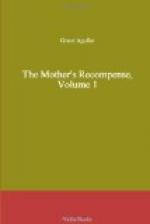She had been deceived, and in that word, when applied to a young, aspiring, trusting mind, what anguish does it not comprise. True, she deserved her chastisement, not only that she had acted the part of a deceiver to one who trusted her far more than she had done Lord Alphingham, but wilfully she had blinded herself to her own feelings, that she might prove her independence; yet these facts lessened not the bitterness of feeling which was now often hers. But she did not relinquish society; the dread of encountering Lord Alphingham was not strong enough to overcome her secret wish that, by her conduct in society, she might prove to St. Eval that, although unworthy to be selected as his wife, she would yet endeavour to regain his esteem. She had resolved to think less of herself and more of others, and thus become more amiable in their sight, and not feel so many mortifications, as by her constant desire for universal homage, she had previously endured. She knew the task was difficult so to conquer herself, and doubting her own strength, was led to seek it where alone it could be found. To none did she confess these secret feelings and determination; calmly and steadily she looked forward, and so successfully had she schooled herself to submission, that no word or sign as yet betrayed to her parents the real state of her affections.
Emmeline’s dislike to London had abated as much as had her sister’s glowing anticipations. They were now only to be four months in the metropolis; the strict routine of masters, etc., was at an end, and she was to accompany Mrs. Hamilton whenever she went out. She left Oakwood with regret, and the society and conversation of Arthur Myrvin were missed more often in London than she chose to confess, but enjoyment was ever found for Emmeline—life was still a romance to her. In the society of London, as in the cottages of Oakwood, she was beloved, and she was happy; but those of the opposite sex, much as they thronged around her, had no more thought of demanding such a being in marriage, than she had of what is termed making conquests. It was therefore with feelings of much less anxiety Mr. and Mrs. Hamilton mingled in society this season, for the conduct of both their daughters was such as to afford them satisfaction.
Some changes had taken place in many of the personages with whom we are acquainted, since the last time we beheld them. Short and evanescent is fashionable popularity. Lord Alphingham’s reign might be, in a degree, considered over. Some rumours had been floating over the town at that time of the year when, in all probability, he thought himself most secure, that is, when London society is dispersed; rumours which had the effect of excluding him from most of those circles in which Mr. Hamilton’s family mingled, and withdrawing from him in a great measure the friendship of Montrose Grahame, who, the soul of honour himself, shrunk from any connection with one whose reputation the faintest breath had




